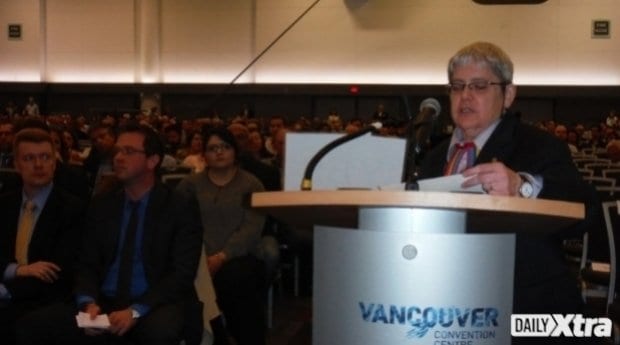Three quarters of BC’s lawyers have voted against approving Trinity Western University’s (TWU) proposed law school.
The vote, which is binding on the Law Society of BC, the governing body for the legal profession in the province, took place over the past month and saw 5,951 law society members, mail in ballots against the Christian law school; 2,088 were in favour of allowing TWU’s future graduates to practise in BC.
“It is a proud day to be a lawyer,” lawyer barbara findlay says in a press release.
The law society is due to discuss the outcome of the referendum on Oct 31. The referendum was conducted by mail-in ballot and required one-third of BC’s lawyers to participate and two-thirds to vote in favour in order to pass. Some 13,530 practising, non-practising and retired lawyers were entitled to vote.
The law society’s directors (commonly called benchers) had initially agreed to accredit the Christian university’s graduates in a vote in April, but a membership petition forced a special general meeting in June to reconsider the matter. Members at the special general meeting voted overwhelmingly to urge the society’s board of directors to rescind its earlier approval and vote again.
The board’s approval in April was based largely on a 2001 Supreme Court of Canada decision that upheld TWU’s right to teach Christian values and to insist that its students sign a covenant agreeing to uphold Christian biblical teachings, including no premarital sex and no homosexuality.
Though many law society board members expressed their distaste for the covenant, they said their hands were tied by the existing legal decision. Attendees at the special general meeting in June disagreed, saying the law society is responsible for setting the legal course in BC.
“Respect for equality is a foundation principle of the rule of law and should be a foundation principle of the legal profession,” says lawyer Michael Mulligan, whose petition triggered the special general meeting in June. “I am delighted that the profession agrees so wholeheartedly with that principle and that the benchers will move forward on that basis.”
“I am so proud to be entering the profession knowing that my colleagues stand up for principles of equality,” says Jill Bishop, who completed her undergraduate studies at TWU before studying law at the University of Saskatchewan.
“The experience of being educated at TWU was very oppressive to me, as a lesbian who had to sign the restrictive covenant,” Bishop says. “I am so glad that the benchers will be reversing their decision.”

 Why you can trust Xtra
Why you can trust Xtra


